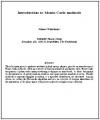
Introduction To Monte Carlo Algorithms
by Werner Krauth
Publisher: CNRS-Laboratoire de Physique Statistique 1998
Number of pages: 43
Description:
In these lectures, the author discusses the fundamental principles of thermodynamic and dynamic Monte Carlo methods in a simple light-weight fashion. The keywords are Markov chains, Sampling, Detailed Balance, A Priori Probabilities, Rejections, Ergodicity, "Faster than the clock algorithms".
Download or read it online for free here:
Download link
(380KB, PDF)
Similar books
 Modern Computational Methods in Solids
Modern Computational Methods in Solidsby Adrian Feiguin - University of Wyoming
The purpose of this course is to introduce students to a series of paradigmatic physical problems in condensed matter, using the computer to solve them. The course will feel like a natural extension of introductory condensed matter.
(11057 views)
 Computational Physics: Problem Solving with Computers
Computational Physics: Problem Solving with Computersby Rubin H Landau, Manuel J Paez, Cristian Bordeianu - Wiley-VCH
This text surveys many of the topics of modern computational physics from a computational science point of view. Its emphasis on learning by doing (assisted by many model programs), as with 2nd Edition, but with new materials as well as with Python.
(9676 views)
 Computational Physics with Python
Computational Physics with Pythonby Mark Newman - University of Michigan
The Python programming language is an excellent choice for learning, teaching, or doing computational physics. This page contains a selection of resources the author developed for teachers and students interested in computational physics and Python.
(17250 views)
 Introduction to Monte Carlo Methods
Introduction to Monte Carlo Methodsby Stefan Weinzierl - arXiv
These lectures given to graduate students in high energy physics, provide an introduction to Monte Carlo methods. After an overview of classical numerical quadrature rules, Monte Carlo integration and variance-reducing techniques is introduced.
(11291 views)